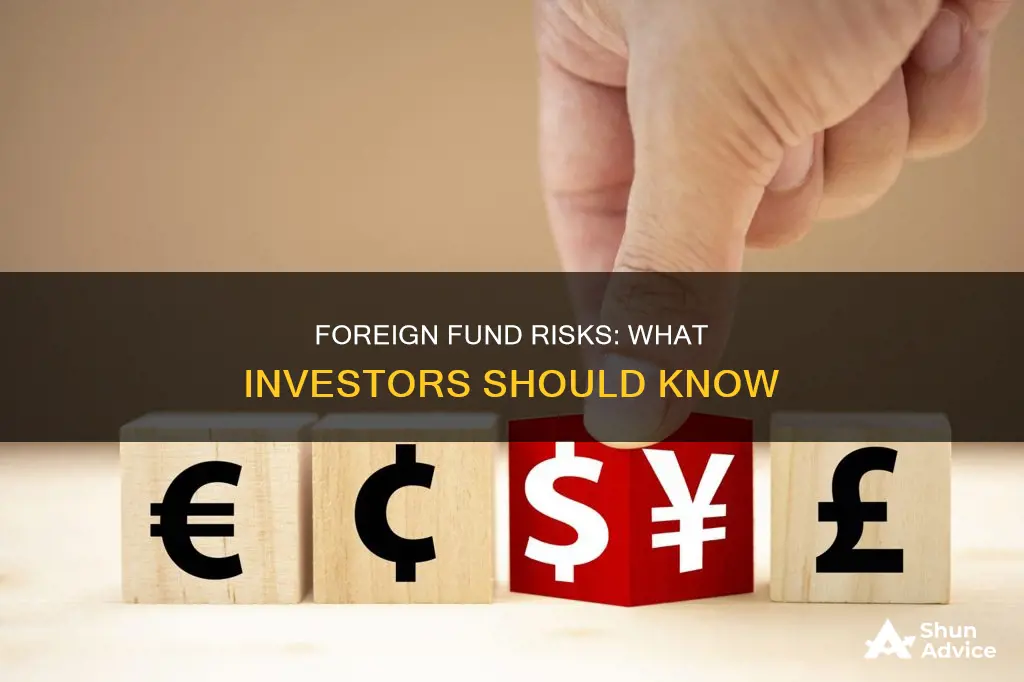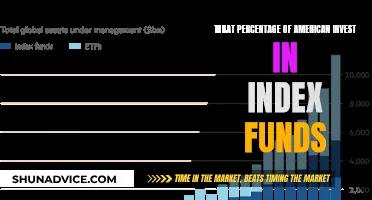
Investing in foreign funds can be a risky business. While it may be tempting to diversify your portfolio by investing in international markets, there are several factors that could impact your investments. These include higher transaction costs, currency volatility, and liquidity issues. Political, economic, and social events in other countries can be difficult to predict and understand, and they can have a significant impact on the value of your investments. There's also the issue of access to information, as foreign companies are not required to provide the same level of disclosure as domestic companies, and the information provided may not be in English. On top of that, foreign markets may operate differently than what you're used to, and legal remedies may be harder to come by if something goes wrong. Finally, there's the risk of unexpected political, economic, or sovereign default risk unique to specific countries, which could result in investment losses. So, while investing in foreign funds can have its benefits, it's important to carefully consider the potential risks involved.
| Characteristics | Values |
|---|---|
| Higher Transaction Costs | Brokerage commissions, stamp duties, levies, taxes, clearing fees, and exchange fees |
| Currency Volatility | Fluctuations in exchange rates can increase or reduce investment returns |
| Liquidity Risk | May not be able to sell an investment quickly without incurring substantial losses |
| Information Access | Difficult to access information on companies outside the U.S. |
| Broker or Investment Adviser | Foreign brokers or advisers may not be registered with the SEC, leading to less investor protection |
| Political, Economic, and Social Events | Uncertainty due to political, economic, and social factors that are challenging to understand |
| Legal Remedies | Difficult to seek legal remedies outside the U.S. |
| Market Operations | Foreign markets operate differently than U.S. markets |
| Taxation | Local tax implications and double taxation on foreign investments |
| Economic and Political Risk | Political and economic decisions can impact a country's willingness to pay debts or maintain a hospitable investment climate |
| Interest Rate Risk | Fluctuating interest rates can impact the value of foreign assets |
| Information Availability | Lack of information on publicly traded assets in some countries |
What You'll Learn

Higher transaction costs
Investing in foreign funds can be a costly endeavour, with higher transaction costs acting as a significant barrier. These costs can vary greatly depending on the foreign market in question, and investors should be aware of the various fees and charges they may encounter.
One of the most common types of fees is the foreign transaction fee, which is typically imposed by credit card issuers on transactions made in a foreign currency or with a foreign merchant. These fees usually range from 1% to 3% of the transaction value and are often paid by travellers in their home currency. For example, a foreign transaction fee of 3% on $1,000 spent will result in a $30 fee. These fees can add up quickly, especially on extended trips or for larger purchases.
Additionally, there may be charges associated with using foreign ATMs or making online purchases from overseas vendors. Some banks and credit card issuers may also impose currency conversion fees, which are separate from foreign transaction fees and can further increase the overall cost.
When investing in international markets, brokerage commissions tend to be higher than domestic rates. On top of that, there can be a multitude of additional charges, such as stamp duties, levies, taxes, clearing fees, and exchange fees. These charges can significantly increase the cost of investing in foreign funds.
For instance, a U.S. investor purchasing a single stock in Hong Kong would incur a brokerage commission of approximately $38.28 per trade, based on the exchange rate as of July 20, 2023. Moreover, investing through a fund or professional manager will typically result in a higher fee structure to account for the additional time and resources required for research and analysis of foreign markets.
To mitigate these higher transaction costs, investors can consider investing in American Depositary Receipts (ADRs). ADRs are negotiable financial instruments issued by U.S. banks, representing a foreign company's stock but traded as a U.S. stock, thereby eliminating foreign exchange fees. However, it is important to note that investing in ADRs still carries currency price fluctuation risks.
In summary, higher transaction costs are a significant risk factor when investing in foreign funds. These costs can take various forms, including foreign transaction fees, brokerage commissions, and other local market charges. While strategies like investing in ADRs can help reduce these costs, investors should carefully evaluate the fees associated with their desired foreign market investments.
Invest in Nifty Total Market Index Fund: A Comprehensive Guide
You may want to see also

Currency volatility
For example, if an investor's foreign investment portfolio generated a 12% rate of return but their home currency lost 10% of its value, the net return would be enhanced when converted to their home currency. However, if the foreign investment declines and the home currency strengthens, it will further dampen the returns.
Another strategy to manage currency risk is to invest in international markets through American Depository Receipts (ADRs). ADRs are sold in US dollars, eliminating foreign exchange fees. However, investors are still vulnerable to currency price fluctuations, as the value of the ADR will drop if the US dollar falls in value against the foreign currency.
A Guide to Mutual Funds: Investing Basics
You may want to see also

Political risk
An extreme example of political risk in foreign investment is the Russia-Ukraine conflict, which led to economic sanctions on Russia and, in turn, retaliatory measures by the Russian government that harmed foreign investors with assets in the country. Geopolitical factors can significantly influence investments, especially in autocratic nations.
When evaluating political risk, investors can consider a country's risk level, typically categorized as developed, emerging, or frontier markets. Developed markets, such as the United States, Canada, and Japan, are generally considered safer investment destinations due to their stable political systems and well-entrenched rule of law. On the other hand, emerging markets like China, India, and Brazil may offer higher investment returns but carry more political uncertainty and economic volatility. Frontier markets, such as Nigeria and Botswana, are the riskiest but can provide above-average returns over time and additional diversification benefits.
To assess political risk, investors can refer to sources such as sovereign credit ratings from agencies like Moody's, Standard & Poor's (S&P), and Fitch, as well as independent publications like The New York Times, The Wall Street Journal, and The Economist, which provide insights into the political and economic climate of foreign countries.
Equity Funds: Smart Investment, Smart Returns
You may want to see also

Lack of information
Investing in foreign funds can be a great way to diversify your portfolio and take advantage of growth in foreign economies, particularly emerging markets. However, it is not without its risks. One of the key risks is the lack of information.
When investing in foreign funds, you may encounter challenges in accessing the same level of information that you would have for US-based investments. Many companies outside the US do not provide investors with the same type of information as US public companies, and even if they do, the information may not be available in English. This lack of transparency can make it difficult to make informed investment decisions and assess the risks involved.
For example, you may not have access to financial reports, news, or analysis in a language you understand. This can make it challenging to stay up-to-date with the company's performance, strategic direction, and any potential risks or opportunities that may impact your investment. Additionally, the regulatory environment and reporting standards may differ from those in the US, making it harder to compare and evaluate investment opportunities.
Furthermore, foreign companies may not be subject to the same disclosure requirements as US companies, and their financial statements may not be prepared in accordance with US GAAP or other familiar accounting standards. As a result, it can be difficult to assess the financial health and stability of the company, identify potential red flags, or compare it against similar companies in the same industry.
The lack of information also extends to understanding the broader economic and political landscape of the country in which you are investing. Political decisions and economic policies can have a significant impact on investment returns, and it can be challenging to stay abreast of these factors, especially in countries with less stable political systems or frequent changes in government.
To mitigate this risk, investors should conduct thorough research and due diligence before investing in foreign funds. This includes analyzing the country's economic and political climate, reviewing locally produced news sources, and seeking out expert opinions or analysis from organizations specializing in country risk assessments. Additionally, diversifying your investments across multiple countries and industries can help reduce the impact of any single information gap.
While the lack of information can be a challenge, it is not insurmountable. By conducting diligent research and seeking out reliable sources of information, investors can make more informed decisions when investing in foreign funds.
Healthcare Funds: Worthy Investment or Risky Business?
You may want to see also

Lack of liquidity
Liquidity risk is a significant concern when investing in foreign funds, particularly in emerging markets. Liquidity risk refers to the possibility that an investor may not be able to sell an investment quickly without incurring substantial losses due to political or economic crises. This risk is heightened in foreign markets due to lower trading volumes, fewer listed companies, and shorter trading hours.
Market liquidity risk arises when an investor cannot execute transactions at current market prices due to insufficient market depth or disruptions. This is a particular challenge in illiquid markets, where large transactions can significantly impact share prices. For example, selling a large volume of shares in a thinly traded stock could lead to a significant drop in the share price, resulting in a loss for the seller.
Funding liquidity risk pertains to the challenges an investor may face in obtaining the necessary funds to meet short-term financial obligations. This could be due to the mismanagement of cash, a decline in creditworthiness, or unfavourable market conditions that deter lenders or investors. Even creditworthy entities may struggle to secure short-term funding during periods of financial turbulence.
The impact of liquidity risk can be severe, leading to financial losses, operational disruptions, and reputational damage. In extreme cases, it can even drive an entity towards insolvency or bankruptcy. Therefore, effective liquidity risk management is crucial. This involves maintaining a portfolio of high-quality liquid assets, employing rigorous cash flow forecasting, and diversifying funding sources.
To mitigate liquidity risk, investors should pay close attention to foreign investments that are or may become illiquid by the time they want to sell. Common ways to evaluate the liquidity of an asset include observing the bid-ask spread over time and analysing trading volumes and market capitalisation.
Additionally, investors should be aware of the regulatory frameworks that govern liquidity risk management in different countries. For example, the Basel III framework sets stringent liquidity standards for banks to ensure financial stability and protect depositors' interests. Understanding these regulations can help investors make more informed decisions about their foreign investments.
A Guide to Investing in Mutual Funds via Zerodha
You may want to see also
Frequently asked questions
There are several risks associated with investing in foreign funds, including higher transaction costs, currency volatility, and liquidity issues.
Currency volatility refers to the fluctuations in exchange rates between the US dollar and the currency of the foreign investment. These changes in exchange rates can increase or decrease your investment returns.
Foreign markets, especially emerging markets, may have lower trading volumes and fewer listed companies. They may also have shorter trading hours, making it challenging to sell investments quickly without incurring substantial losses.







